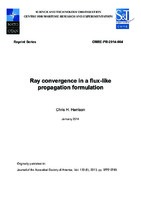| dc.contributor.author | Harrison, Chris H. | |
| dc.date.accessioned | 2018-10-11T14:09:46Z | |
| dc.date.available | 2018-10-11T14:09:46Z | |
| dc.date.issued | 2014/01 | |
| dc.identifier | 47928 | |
| dc.identifier.govdoc | CMRE-PR-2014-004 | |
| dc.identifier.uri | http://hdl.handle.net/20.500.12489/680 | |
| dc.description.abstract | The energy flux formulation of waveguide propagation is closely related to the incoherent mode sum, and its simplicity has led to development of efficient computational algorithms for reverberation and target echo strength, but it lacks the effects of convergence or modal interference. By starting with the coherent mode sum and rejecting the most rapid interference but retaining beats on a scale of a ray cycle distance it is shown that convergence can be included in a hybrid formulation requiring minimal extra computation. Three solutions are offered by evaluating the modal intensity cross terms using Taylor expansions. In the most efficient approach the double summation of the cross terms is reduced to a single numerical sum by solving the other summation analytically. The other two solutions are a local range average and a local depth average. Favourable comparisons are made between these three solutions and the wave model Orca with, and without, spatial averaging in an upward refracting duct. As a by-product, it is shown that the running range average is very close to the mode solution excluding its fringes, given a relation between averaging window size and effective number of modes which, in turn, is related to the waveguide invariant. | |
| dc.format | 13 p. : ill. ; digital, PDF file | |
| dc.language | English | |
| dc.publisher | CMRE | |
| dc.source | In: Journal of the Acoustical Society of America, vol. 133 (6), 2013, pp. 3777-3789. | |
| dc.subject | Underwater acoustics | |
| dc.subject | Acoustic propagation | |
| dc.subject | Computational acoustics | |
| dc.subject | Waveguides | |
| dc.title | Ray convergence in a flux-like propagation formulation | |
| dc.type | Reprint (PR) | |
| dc.type | Papers and Articles | |
